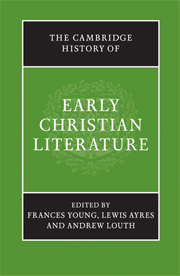Book contents
- Frontmatter
- PART ONE The Beginnings: The New Testament to Irenaeus
- A LITERARY GUIDE
- B CONTEXT AND INTERPRETATION
- 7 Social and historical setting
- 8 Articulating identity
- 9 Christian teaching
- 10 Conclusion: towards a hermeneutic of second-century texts
- PART TWO THE THIRD CENTURY
- PART THREE FOUNDATION OF A NEW CULTURE: FROM DIOCLETIAN TO CYRIL
- Bibliographies
- Index
- Map: The Roman Empire in the late fourth century AD"
- References
9 - Christian teaching
from B - CONTEXT AND INTERPRETATION
Published online by Cambridge University Press: 28 March 2008
- Frontmatter
- PART ONE The Beginnings: The New Testament to Irenaeus
- A LITERARY GUIDE
- B CONTEXT AND INTERPRETATION
- 7 Social and historical setting
- 8 Articulating identity
- 9 Christian teaching
- 10 Conclusion: towards a hermeneutic of second-century texts
- PART TWO THE THIRD CENTURY
- PART THREE FOUNDATION OF A NEW CULTURE: FROM DIOCLETIAN TO CYRIL
- Bibliographies
- Index
- Map: The Roman Empire in the late fourth century AD"
- References
Summary
The literary deposit of early Christianity is most often used as source material for tracing the development of doctrine. But religion in the ancient world was not dogmatic. The Latin words religio and pietas referred to the obligations a person owed not merely to the gods but also to society, to parents and family; the Greek word ευσεβεΙα meant offering respect to divinities through customary rituals. Traditional practice was far more important than belief or unbelief. This was true for Jews as well as Gentiles. In the second century Christians were accused of being atheists because they withdrew from conventional religious practices.
Dogmata or doctrina (both words meaning ‘teaching(s)’) belonged not to religion but to schools, and it was the philosophical schools which principally generated doctrine, whether about metaphysics or morals. Philosophers might debate the existence and nature of the gods, but on the whole endorsed convention. Thus, apart from the Epicureans, they avoided the accusations faced by the Christians. The Christian retort was to attack false gods and claim that they worshipped and obeyed, in a rational and moral way, the one true God, the divinity philosophers acknowledged but in their case with no practical consequences. Only through the Christian claim to teach the truth were religious practice, ethics and doctrine integrated and dogma made central to religion. Within the social context of the ancient world, the placing of literature at the heart of the community’s activities also suggests something more like a school than a religious gathering.
- Type
- Chapter
- Information
- The Cambridge History of Early Christian Literature , pp. 91 - 104Publisher: Cambridge University PressPrint publication year: 2004
References
- 36
- Cited by

